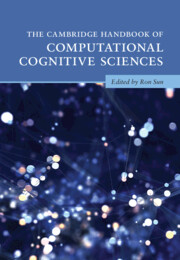Book contents
- The Cambridge Handbook of Computational Cognitive Sciences
- Cambridge Handbooks in Psychology
- The Cambridge Handbook of Computational Cognitive Sciences
- Copyright page
- Contents
- Preface
- Contributors
- Part I Introduction
- Part II Cognitive Modeling Paradigms
- Part III Computational Modeling of Basic Cognitive Functionalities
- Part IV Computational Modeling in Various Cognitive Fields
- 23 Computational Models of Developmental Psychology
- 24 Computational Models in Personality and Social Psychology
- 25 Computational Modeling in Industrial-Organizational Psychology
- 26 Computational Modeling in Psychiatry
- 27 Computational Psycholinguistics
- 28 Natural Language Understanding and Generation
- 29 Computational Models of Creativity
- 30 Computational Models of Emotion and Cognition-Emotion Interaction
- 31 Computational Approaches to Morality
- 32 Cognitive Modeling in Social Simulation
- 33 Cognitive Modeling for Cognitive Engineering
- 34 Modeling Vision
- 35 Models of Multi-Level Motor Control
- Part V General Discussion
- Index
- References
29 - Computational Models of Creativity
from Part IV - Computational Modeling in Various Cognitive Fields
Published online by Cambridge University Press: 21 April 2023
- The Cambridge Handbook of Computational Cognitive Sciences
- Cambridge Handbooks in Psychology
- The Cambridge Handbook of Computational Cognitive Sciences
- Copyright page
- Contents
- Preface
- Contributors
- Part I Introduction
- Part II Cognitive Modeling Paradigms
- Part III Computational Modeling of Basic Cognitive Functionalities
- Part IV Computational Modeling in Various Cognitive Fields
- 23 Computational Models of Developmental Psychology
- 24 Computational Models in Personality and Social Psychology
- 25 Computational Modeling in Industrial-Organizational Psychology
- 26 Computational Modeling in Psychiatry
- 27 Computational Psycholinguistics
- 28 Natural Language Understanding and Generation
- 29 Computational Models of Creativity
- 30 Computational Models of Emotion and Cognition-Emotion Interaction
- 31 Computational Approaches to Morality
- 32 Cognitive Modeling in Social Simulation
- 33 Cognitive Modeling for Cognitive Engineering
- 34 Modeling Vision
- 35 Models of Multi-Level Motor Control
- Part V General Discussion
- Index
- References
Summary
Creativity is typically defined as producing something that is novel, useful, and surprising. Such endeavor plays a critical role in the arts and scientific discovery. However, not all creativity is groundbreaking or historically important. As a common cognitive activity, creativity is amenable to scientific investigation leading to a process-based understanding, so it should be possible to propose models and write computer programs simulating the creativity process. However, the path from cognitive models to computational models is still not trodden as often as would be beneficial. This chapter reviews common concepts underlying many computational creativity efforts, namely idea generation, search, and evaluation. Two example computational models are described in more detail, namely the explicit-implicit interaction theory and the CreaCogs architecture. The chapter concludes with a discussion of current shortcomings and future directions for computational creativity as well as discussing promising avenues and successes of current models.
- Type
- Chapter
- Information
- The Cambridge Handbook of Computational Cognitive Sciences , pp. 947 - 972Publisher: Cambridge University PressPrint publication year: 2023

